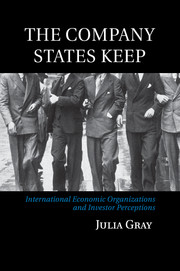Book contents
- Frontmatter
- Contents
- List of Figures
- List of Tables
- Acknowledgments
- 1 Introduction: The Company You Keep
- 2 International Institutions and Sovereign Risk
- 3 The Company You Keep in Comparative Perspective
- 4 The Effects of Good Company
- 5 When Emerging Markets Join Up with Bad Company
- 6 How Risk for Core Members Changes on IO Expansion
- 7 Conclusion
- Bibliography
- Index
6 - How Risk for Core Members Changes on IO Expansion
Published online by Cambridge University Press: 05 October 2013
- Frontmatter
- Contents
- List of Figures
- List of Tables
- Acknowledgments
- 1 Introduction: The Company You Keep
- 2 International Institutions and Sovereign Risk
- 3 The Company You Keep in Comparative Perspective
- 4 The Effects of Good Company
- 5 When Emerging Markets Join Up with Bad Company
- 6 How Risk for Core Members Changes on IO Expansion
- 7 Conclusion
- Bibliography
- Index
Summary
When emerging markets join international organizations, the effects are clear: investor perceptions of risk rise or fall depending on the reputations of the other members of the organization. But what happens to those existing members once new countries join their ranks? Does the reputation of a group of good members take a hit if a less reputable member comes in? When do bad reputations overwhelm good ones, and whose reputation in a given organization might suffer? And how might those effects be disentangled – do investors rationally fear contagion if a new member gets into economic trouble, or are they making irrational assumptions about an old member's trajectory, based on the type of company it keeps?
International organizations frequently expand, yet very little research has been directed toward the consequences of IO enlargement. Scholars who support the view that treaties are endogenous strategies often claim that institutions are chosen from an infinitely large set of possible treaties and may be chosen based on likely compliance. That is, heads of state will not expend their energies negotiating agreements that will not be upheld by members. This view holds that the institutions that we observe in the world should not take on risk – but this chapter provides evidence that letting in new members does precisely that.
- Type
- Chapter
- Information
- The Company States KeepInternational Economic Organizations and Investor Perceptions, pp. 162 - 188Publisher: Cambridge University PressPrint publication year: 2013



